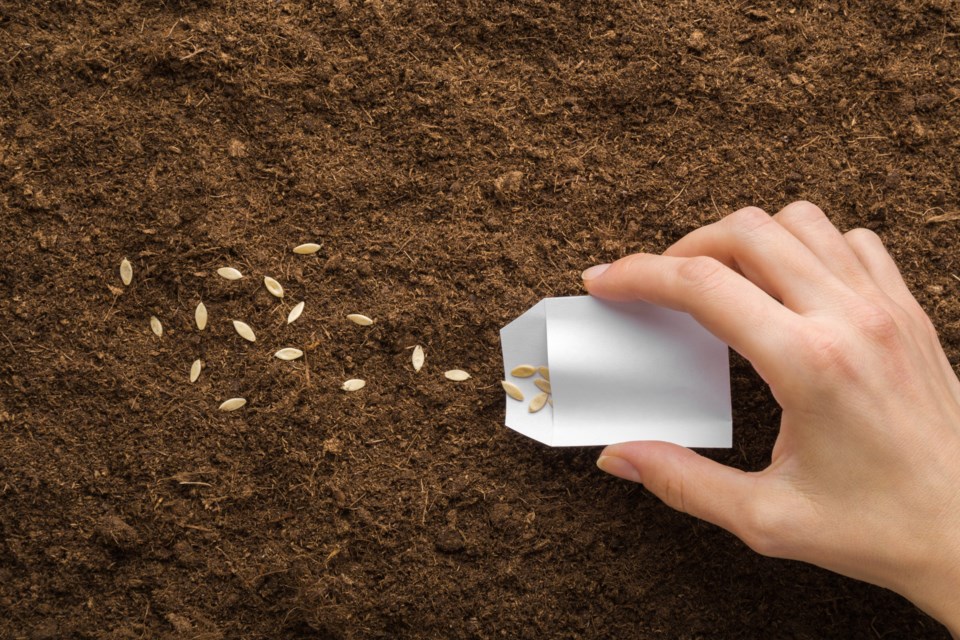In her book Seeds of Hope: Wisdom and Wonder from the World of Plants, anthropologist Jane Goodall, also an avid gardener, describes how, as a child, lining a glass jar with blotting paper, placing in seeds and observing with wonder, how with time, they burst through the seed coat and thrust toward the light.
Due to rationing during the Second World War, she observed how people saved seeds and maintained backyard gardens to grow food.
Today, in these unsettling times, that may be a reason for the resurgent attraction to seed saving and gardening popularity.
So, it was with some interest I recently attended a talk at the Squamish Public Library, sponsored by Squamish CAN, on seeding, where I discovered there is more to it than putting seeds in a jar, replanting them in soil and watching them grow.
In her talk, Marie-ève Boutin, sustainable food projects co-ordinator, with SquamishCAN, asked why one would save seeds. Yes, saving your own seeds and trading with friends means you don’t have to pay for them. It was also mentioned that 75% of food biodiversity has become extinct in the last 100 years.
By preserving varieties, we are keeping seeds alive for future generations. Mass marketing that determines ripening time, uniform taste and appearance can make for stale food sources, so saving the seeds of your favourite fruits, veggies and plants makes tasteful sense.
And nurturing a seed to fruition feeds the soul. (You can quote me on that.)
Boutin spoke on seed anatomy and ways to pollinate plants. (One can sprinkle boy pollen on the girl stem or vice-versa. And some plants can self-pollinate and not have to depend on insects, but we’ll keep sex out of it. Ha ha.)
She stressed the importance of keeping the seeds dry in storage, so that they won’t germinate in the jar, resulting in having less strength to grow fully when planted.
An amusing anecdote about seeding, she cited, was that in 2005, a 2,000-year-old date palm seed found by archaeologists excavating in Israel germinated, thanks to being preserved in ideal conditions: dry, dark and cool.
She advised to make sure to label, using glass containers noting the variety, year and grower of the seed for future reference.
Boutin oversees Squamish CAN's Squamish Seed Library. Although it’s difficult to know how many are active, the seed library has over 400 members.
The Squamish Public Library provides the space for the seed library, which includes seeds, envelopes and information pamphlets.
An annual $5 donation assures Seed Library membership granting access to the seeds available.
Members can collect seeds but are asked to take only two or three seeds for every plant one intends to grow.
The popular concept of Seedy Saturdays, community gatherings and fairs celebrating all things seedy, from information tables to seed swapping, began in Vancouver in 1990. Nowadays, Seedy Saturdays are sprouting up as annual events across Canada. In Squamish, they are held in late February or early March, usually at Brennan Park. Stay tuned, for details of the 2025 events, Boutin suggests, by signing up for SquamishCAN’s newsletter.
SquamishCAN (Climate Action Network) strives to empower our community with just and active solutions to the climate crisis through education, policy development and systems change.
Learn more about seed saving at www.Squamishcan.net.
Melody Wales is a Squamish veteran writer and lover of seeds. This is her last column for The Squamish Chief. We thank her for her years of contributing her insights to our pages. She is now moving on to writing her memoir, which we can’t wait to read.
*Please note that this column has been corrected to say that the Squamish Public Library provides space for the Squamish Seed Library. Squamish CAN supplies the seeds and other items. The original article said the public library supplies the seeds, which was incorrect.




